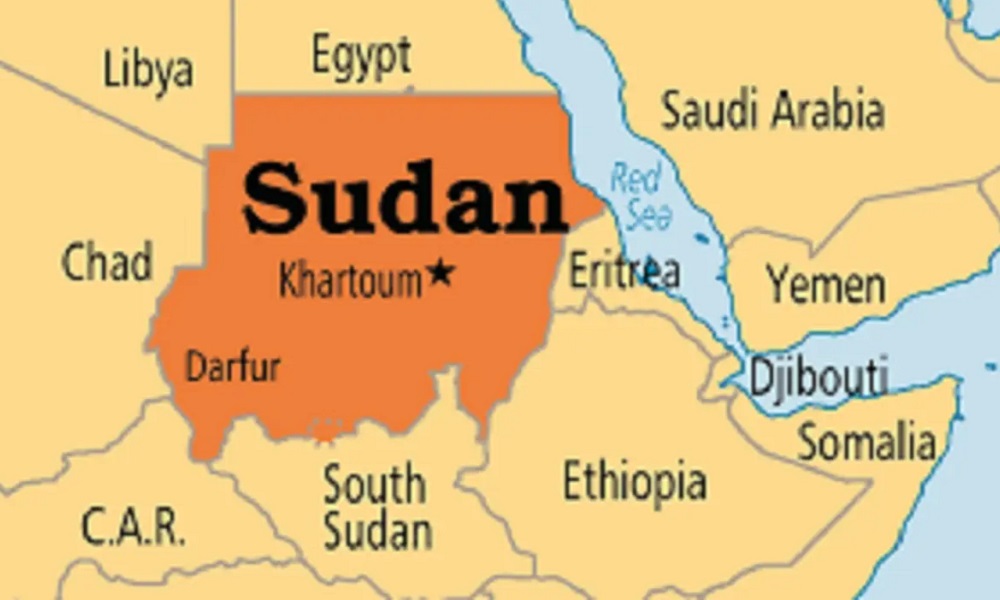News
Drone attack on hospital kills 67 in Sudan

A drone attack on one of the last functioning hospitals in El-Fasher in Sudan’s Darfur region has killed 67 people and injured dozens, local activists and a medical source said on Saturday.
“Thirty-seven of those injured in the drone strike yesterday died today, bringing the number of victims up to 67,” the source told AFP, requesting anonymity for fear of retaliation.
He added that a number of those injured were still being treated but could not give an exact figure.
The bombing of the Saudi Hospital late Friday had “led to the destruction” of the hospital’s emergency building, the source said.
AFP could not independently verify which of Sudan’s warring sides had launched the attack.
Since April 2023, the Sudanese army has been at war with the paramilitary Rapid Support Forces (RSF), who have seized nearly the entire vast western region of Darfur.
Since May, they have besieged El-Fasher, the state capital of North Darfur, but have not managed to claim the city where army-aligned militias have repeatedly pushed them back.
Last week, the RSF issued an ultimatum demanding army forces and allies leave the city by Wednesday afternoon in advance of an expected offensive.
Local activists have reported intermittent fighting since, including repeated artillery fire from the RSF on the famine-hit Abu Shouk displacement camp.
On Friday morning alone, heavy shelling killed eight people in the camp, according to civil society group the Darfur General Coordination of Camps for the Displaced and Refugees.
The United Nations has voiced alarm, calling on both parties to ensure the protection of the city’s civilian population — some two million people.
“The people of El-Fasher have suffered so much already,” Seif Magango, spokesman of the UN rights office, said Wednesday.
– RSF drones –
According to the medical source, the Saudi Hospital’s emergency building had been hit by an RSF drone “a few weeks ago”.
Between December 9 and January 14, Yale University’s Humanitarian Research Lab observed three advanced drones at the RSF-controlled Nyala Airport, some 200 kilometres (124 miles) south.
In its report, it said the Chinese-made drones have “significant electronic surveillance and warfare capabilities and can be equipped with air-to-ground munitions”, but could not verify which countries had purchased them.
The United Arab Emirates has been repeatedly accused of funnelling weapons, including drones, to the RSF.
United Nations experts determined in December 2023 that the allegations were “credible,” but Abu Dhabi has issued repeated denials in the face of mounting international criticism.
In December, it assured the Joe Biden administration that it was “not now transferring any weapons” to the RSF.
But on Friday, two US lawmakers said the UAE had violated its promises to Washington and “is continuing to provide weapons” to the RSF — who the United States concluded earlier this month had committed “genocide” in Darfur.
– Army gains –
The RSF’s latest attempt to consolidate its hold on war-ravaged Darfur — a vast region about the size of France, home to a quarter of Sudan’s population — comes as the army claims significant victories elsewhere.
Some 850 kilometres east, army chief Abdel Fattah al-Burhan on Saturday toured the Jaili oil refinery, the country’s largest, a day after his forces reclaimed it.
In a statement, his ruling Transitional Sovereignty Council said Burhan “pledged to rebuild what the militia had destroyed” and rehabilitate a key economic resource.
The military on Friday also broke a paramilitary siege on its Khartoum headquarters, which the RSF had encircled since the war began in April 2023.
Earlier this month, the army successfully wrested control of key state capital, Wad Madani, just south of Khartoum, from the RSF.
Since the war began, both the army and the RSF have been accused of war crimes, including targeting civilians and indiscriminately shelling residential areas.
Before leaving office on Monday, the Biden administration sanctioned Burhan, accusing the army of attacking schools, markets and hospitals and using food deprivation as a weapon of war.
Across the country, up to 80 percent of healthcare facilities have been forced out of service, according to official figures.
In El-Fasher, where ambulances and hospital buildings have been routinely targeted, medical charity Doctors Without Borders said this month the Saudi Hospital was “the only public hospital with surgical capacity still standing.”
The war has so far killed tens of thousands, uprooted more than 12 million and brought millions to the brink of mass starvation.
In the area around El-Fasher, famine has already taken hold in three displacement camps — Zamzam, Abu Shouk and Al-Salam — and is expected to expand to five more areas, including the city itself, by May, according to a UN-backed assessment.
News
Just in: Police restore Obasa’s security details, withdraw Meranda’s as ex-Lagos speaker set for return

By Kayode Sanni-Arewa
Mudashiru Ajayi Obasa who was impeached as speaker of the Lagos House of Assembly on January 13, 2025, is set to return.
Daily Trust understands that his security details have been restored just as those of Hon. Mojisola Lasbat Meranda, have been withdrawn.
Meranda was Obasa’s deputy before the impeachment. After his removal, the house unanimously elected Meranda, making her the first female to occupy the position in the history of the state.
Though she’s yet to officially resign as the Speaker of the House, her fate was reportedly sealed over the weekend by key All Progressives Congress (APC) leaders who intervened in the crisis rocking the House of Assembly.
Former National Chairman of APC, Chief Bisi Akande, former Governor of Osun State, Chief Olusegun Osoba, former Commissioner for Justice, Dr. Muiz Banire and members of the Governance Advisory Council (GAC) and some of the lawmakers had met over the weekend to find a resolution to the crisis.
It was at the meeting that the fate of Meranda was sealed as she was reportedly asked to vacate her seat.
There are indications that Obasa might return as the Speaker as following the resolutions reached by the leaders which largely favoured Obasa’s return.
“In truth, what they said was that Obasa’s removal was illegal and the lawmakers were directed at the meeting to go and return him,” sources familiar with the matter had said.
It was not clear yet when the House would reconvene to effect the expected changes.
Meranda had adjourned plenary indefinitely two weeks ago when there was commotion in the assembly as a result of invasion by operatives of the Department of State Services (DSS).
News
Canada deports more people, particularly those rejected for refugee status

By Kayode Sanni-Arewa
Canada deported more people last year to hit its highest annual level of removals in about a decade, overwhelmingly deporting people whose refugee claims were rejected, data obtained by Reuters showed.
By late November, Canada’s removal numbers had reached their highest point since at least 2015, when the governing Liberals led by Prime Minister Justin Trudeau came to power
The government has also budgeted more money for deportations this year.
Trudeau’s government, now in its final days, has sought to show Canadians it is getting tough on immigration amid a rising backlog of refugee claims and a backlash against immigrants over concerns that immigration is exacerbating a housing shortage.
Canada’s border agency said the spike in deportations is tied to a “significant increase” in the number of people applying for asylum since 2020, prompting it “to enforce removal orders in a more efficient and timely manner.”
Reuters requested border agency data on deportations, excluding people who left of their own accord and those sent back to the United States as part of a bilateral agreement under which would-be asylum-seekers are turned back.
The remaining total shows Canada deported 7,300 people between January 1 and November 19, 2024, an 8.4% increase over all of 2023 and a 95% increase over 2022.
The border agency did not provide equivalent figures for all of 2024. This week, it posted data online from 2019 to 2024 that do not break down deportations excluding returns to the US under that bilateral agreement. This data also showed an increase in the number of deportations.
About 79% of the 7,300 people deported in the first 11 months of last year were deported because their claim for refugee status had been rejected. That is up from about 75% in 2023 and 66% in 2022.
About 11% of the people deported last year through November 19 were removed for non-compliance with the conditions of their stay in Canada unrelated to a refugee claim, for example, for overstaying a visa. About 7% were deported because they had committed a crime either in Canada or elsewhere.
A spokesperson for Public Safety Minister David McGuinty did not immediately respond to questions about the deportations.
A spokesperson for the border agency said in an email that removal numbers fluctuate.
“The number of removals of those who received a negative asylum determination have increased each year since emerging from the pandemic,” wrote the spokesperson, Luke Reimer.
“These efforts are essential in maintaining the integrity of Canada’s asylum system.”
Canada has been dealing with record numbers of refugee claims, although the monthly totals dropped to 11,838 in January from 19,821 in July. There were 278,457 claims pending as of last month – the highest pending total in decades.
A campaign flag for US President Donald Trump flutters from a private residence between the Canada and US border in Mooers Forks, New York, US, Feb 4, 2025. REUTERS/Brian Snyder
MORE MONEY FOR DEPORTATIONS
One concern with these removals, especially those targeting failed refugee claimants, is that people can be deported while still appealing decisions about the risk they face if returned to their home countries, said Aisling Bondy, president of the Canadian Association of Refugee Lawyers.
“They could be removed even if there is significant error in the risk determination,” she said, worrying people are being deported to places they will face persecution.
Reimer said in an email that the agency “only actions a removal order once all legal avenues of recourse that can stay a removal have been exhausted.”
The rise in refugee claimant deportations speaks to the government’s priorities, including a tough stance on migration, said University of Toronto law professor and Human Rights Chair Audrey Macklin.
“You can decide that you want to make a show of how many people you are deporting to show that you are effective at policing the border,” Macklin said. “Then you go with people who are easier to find and remove, and those are going to be, often, refugee claimants.”
he prospect of deportation could also deter would-be refugee claimants, she said.
Canada is on track to deport even more people in the coming years: Late last year, the government pledged C$30.5 million ($21.3 million) over three years to increase deportations.
Canada Border Services Agency spent C$65.8 million on removals in 2023-24, up from C$56 million the year before.
At the same time, Canada has pledged C$1.3 billion toward border security to appease US President Donald Trump as he threatens sweeping tariffs on Canadian imports.
The ranks of those eligible for deportation could grow.
Canada is slashing temporary and permanent immigrant numbers and part of its plan relies on more than 1.2 million temporary residents, including workers and students, leaving the country next year, and another 1.1 million leaving the following year, according to government figures.
Immigration Minister Marc Miller has said Canada will deport people who do not leave on their own.
“It is people’s choice not to leave, and if they don’t, they face the consequences – including, after due process, deportation,” he told Reuters last year.
News
UNIVERSITY OF BUCKINGHAM (UOB) INTERNATIONAL DIPLOMA OF EDUCATION (IDE)

By Kayode Sanni-Arewa
Obio/Akpor Federal Constituency in partnership with The University of Buckingham will be sponsoring 150 classroom teachers in Obio/Akpor Federal Constituency for the University of Buckingham (UoB) International Diploma of Education (iDE) January cohort of the 2025-2026 session.
Powered by: Rep. O. K. Chinda
Interested primary and secondary school teachers residing in Obio/Akpor Federal Constituency are expected to fill out the form below for the constituency selection process.
Form: https://forms.gle/rbjWgMk8oBRwqxgf7

For enquiries: Call or WhatsApp Marvin Chinda on:- +2348068581032
The minimum academic requirement is an O’level / WASSCE with 5 credits (Inclusive of Mathematics and English) and currently a classroom teacher.
Kenneth George-Oparati
(Administrator),
Obio/Akpor Federal Constituency Office
Port Harcourt, Rivers State
-

 News23 hours ago
News23 hours agoAmaewhule, 26 Other Lawmakers Never Defected To APC, Rivers Chair Confirms
-

 News21 hours ago
News21 hours agoSenate committee on health invites stakeholders to a one-day public hearing on 3 major Bills
-

 News23 hours ago
News23 hours agoHeavy security beef up as APC holds NEC Meeting in Abuja
-

 News14 hours ago
News14 hours agoThey’re after my life i – NAFDAC DG raises alarm
-

 News23 hours ago
News23 hours agoEx-President, Buhari, El-Rufai, Amaechi Absent As APC Holds NEC Meeting
-

 News18 hours ago
News18 hours agoEmefiele: Judge turns down request to withdraw from trial
-

 News23 hours ago
News23 hours agoServices, petrol refining sectors pilot GDP growth to 3.84%
-

 News14 hours ago
News14 hours agoPolice Halt Attempt To Invade Kano Emir’s Palace, Nab 17 Suspects



















